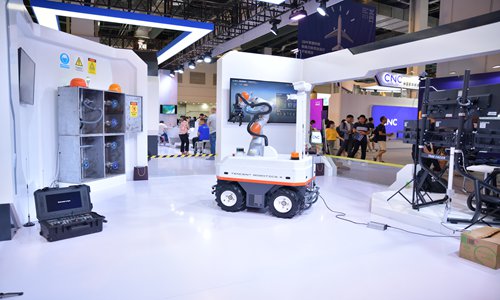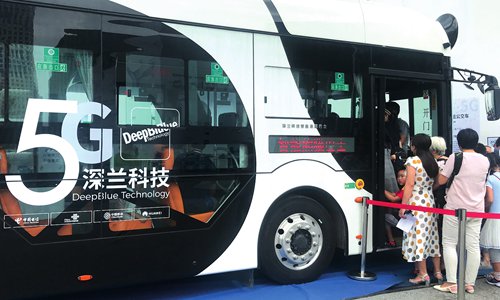HOME >> BUSINESS
China begins selling AI products overseas
By Xie Jun Source:Global Times Published: 2019/9/3 17:03:40
Global wave of industrial upgrading brings domestic technology into the spotlight

A view of Tencent's exhibition area during the World Artificial Intelligence Conference (WAIC) 2019 on Thursday. Photo: IC

Visitors line up to look at the interior of the Panda bus at the WAIC 2019 on Saturday. Photo: Xie Jun/GT
Two decades ago, China was short of high technologies and few people used mobile payments, e-commerce or artificial intelligence (AI) tech-backed products. But now the country is quickly turning into a leading technology power and has already started to sell AI products abroad.
At the outdoor exhibition area of the World Artificial Intelligence Conference (WAIC) 2019, held in Shanghai at the end of August, a self-driving bus with a panda exterior attracted a lot of attention from visitors.
Many boarded the bus and curiously inquired about its technical details. Some asked where in China they could ride such a bus, and one boy asked if it was what a "future bus" would look like.
Developed by the Shanghai-based AI unicorn DeepBlue Technology, the bus is fueled by a lithium iron phosphate battery which empowers the vehicle L3-L4 self-driving technologies. It is also equipped with technologies such as palm-vein recognition system, an abnormal-passenger behavior monitor and voice interaction.
In China, the bus has commenced commercial operations in a number of cities, and DeepBlue has begun to roll out the product in some overseas markets, the company's CEO Chen Haibo disclosed during a WAIC seminar.
Right now, DeepBlue is in talks with the municipal government of Bangkok, Thailand, to export the first batch of Panda intelligent buses to the city.
"At the moment we are discussing implementation with Bangkok in terms of the Panda bus, so negotiations are still ongoing, subject to the laws and performance of the product in Bangkok," a representative from DeepBlue told the Global Times on Monday.
"Bangkok is the first overseas city to express interest [in importing the Panda bus]."
With the rise of China's AI technologies in recent years, DeepBlue is not the only Chinese high-tech startup that is taking its business to overseas markets.
In fact, Chinese firms have been stepping up efforts to introduce domestic AI technologies and products to overseas markets, and there has been some success.
For example, a robot named TankBot, designed by Shenzhen-based robot manufacturing start-up Ubtech, has been sold in certain Apple stores around the world. Ubtech has also launched the humanoid robot Lynx in partnership with US e-commerce giant Amazon, according to media reports.
Domestic drone maker DJI has also cooperated with overseas retailers like Media Markt and Best Buy to sell some of their products. From 2016, DJI began to sell its flagship Phantom 4 unmanned aerial vehicles in hundreds of Apple stores.
Including overseas markets in its overall business plan has yielded some good results for DeepBlue. On Saturday, during the a WAIC forum, DeepBlue signed a contract with Thailand-based retail conglomerate Charoen Pokphand Group to launch DeepBlue's AI self-checkout machines in 7-Eleven stores in Thailand.
The machines use computer vision technology to identify and tag products for checkout and billing, saving consumers the task of scanning traditional barcodes.
Matching needs
Overseas markets' willingness to source and order Chinese high-tech products comes at a time when a trend is sweeping across the world, to embrace advanced technologies including fintech, e-commerce, clean energy and so forth. This trend is not only evident in developed countries, but can also be seen in many emerging markets.
Some Chinese companies that, in the recent wave of technological upgrades, have accumulated many cutting-edge technologies now have the opportunity to put their tech into commercial use, whether in domestic or overseas markets.
"The iteration of China's AI technologies has been extremely fast, partly due to the push of capital and partly due to China's ample technological reserves. In certain areas such as facial recognition, China's technologies lagged behind those in the US or Europe a few years ago, but there's not much gap now," an employee of a Guangzhou-based AI start-up told the Global Times at the WAIC.
This technological leap has caught the eyes of many overseas companies or governments hoping to introduce high-tech products or technologies from China to help with the technological upgrading of their own cities.
"Take electric vehicles for example, many overseas countries care very much about environmental protection and therefore they are quite motivated to replace traditional oil-fueled vehicles with high-tech electric vehicles, which creates market opportunities for companies like us," Chen told the Global Times.
He cited the example of the Panda bus. "The Bangkok authorities wanted to launch such high-tech buses in their cities to change the transportation led by oil-fueled vehicles and lousy traffic conditions, to enhance the image of Bangkok as a famous tourism city," Chen said.
At this year's Boao Forum for Asia, held in South China's Hainan Province in March, several executives from overseas tech companies also expressed to the Global Times their wish to cooperate with Chinese partners. Ming Maa, president of the Singapore-based technology start-up Grab, stressed that the company is always looking for authentic Chinese partners, "because China has some of the best technology companies in the world."
Help from the BRI
Domestic AI companies are also selling their products and technologies abroad with help from the China-proposed Belt and Road Initiative (BRI).
Westwell is a Shanghai-based tech start-up that specializes in autonomous driving technologies and AI chips. The company has recently produced seven self-driving trucks called "Q-Trucks," using the latest generation of self-driving technologies developed by the company's research team. The truck has no driving cab and can work constantly.
Shen Jingxing, Westwell's autonomous driving project manager, told the Global Times that six of the Q-Trucks will be exported to a Southeast Asian country to be used in a local port. The port is an investment of, and run by, a Chinese company involved with one of the BRI projects.
He didn't disclose where exactly the port is located.
"In China, ports are usually very busy so it's hard for domestic port runners to lay off a particular area for self-driving vehicles. The port where our Q-Truck will be exported to, however, is a new port and does not have too much business. This will help our products land," he said. Autonomous driving vehicles need a specific, enclosed area for operation.
Chen also disclosed that DeepBlue is beefing up efforts to expand business, banking on opportunities provided by the BRI. For example, it is in talks with BRI countries like Italy and Greece about using AI to augment their city management systems.
"AI is critical to whether BRI countries can grasp the opportunities in the fourth industrial revolution, and I think China, as one of the world's AI technological leaders, could play an important role in introducing AI products to BRI members," he said.
Too soon for large-scale exports
Despite the varying success of domestic companies receiving overseas orders, industry insiders said that the time for the large-scale, systematic output of AI technologies or products has not yet arrived.
"The prospect [of China exporting AI to overseas markets] is good, but the time is not ripe yet," Lei Tao, CEO of big data platform BeagleData, told the Global Times.
"In China, visual computing such as human-computer interactive language has developed fast. But when it comes to machine learning, China is just taking off. China needs to first complete its own industrial upgrading and digital transformation process before thinking about large-scale tech exporting."
Oscar Xiao, founder of Alva Systems, a Beijing-based heterogeneous computing software design company, told the Global Times that China still relies on overseas companies for certain, basic design software.
"Without such software it's hard for China to export an 'ecosystem,' including matching services and products. It also limits China's abilities to get a large number of clients for its products when the basic technologies are in the hands of others."
He also mentioned that, although some of China's AI technologies have developed quite well, they are mostly used on the fringes of domestic industries such as safety checks. "We need to have technologies that can integrate into the core procedures of manufacturing and become a part of productivity," he said.
Posted in: INDUSTRIES,INSIGHT